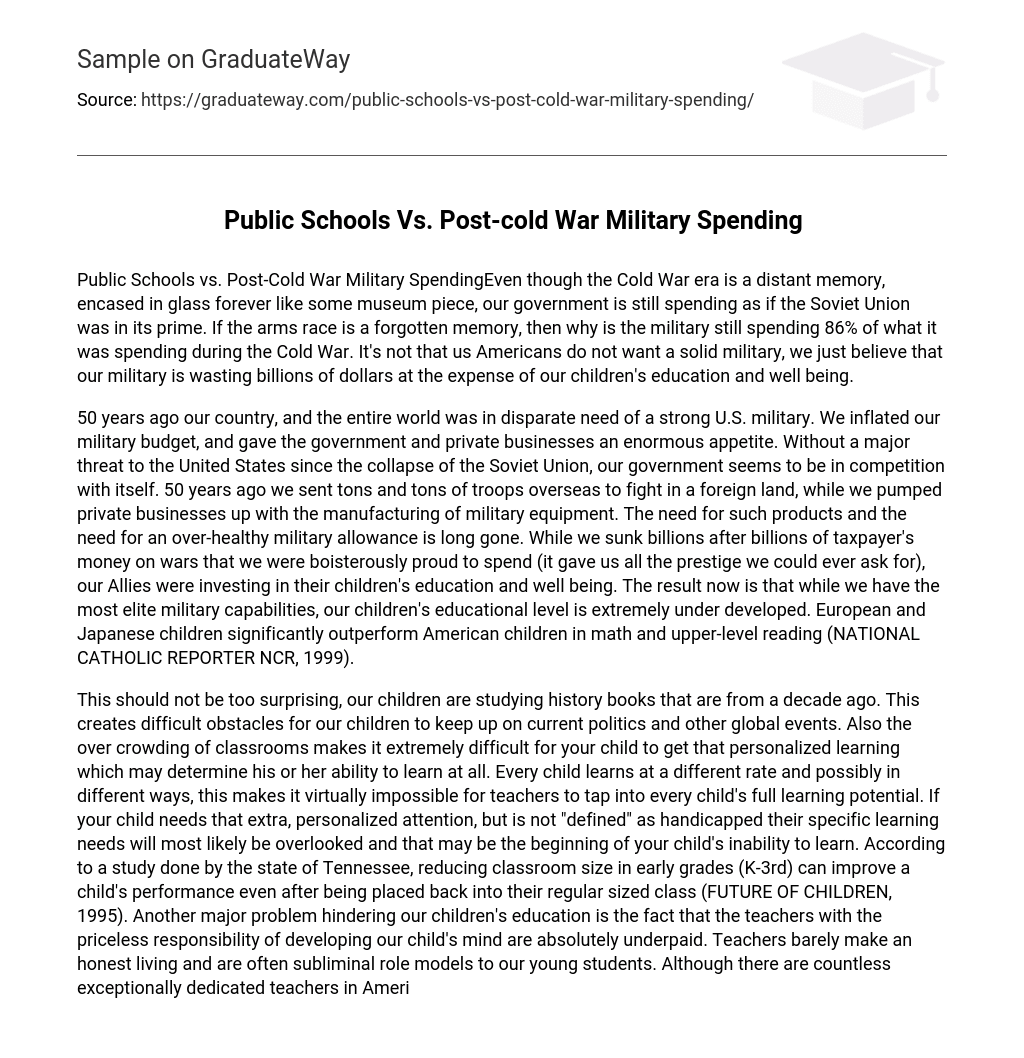The government’s military spending today is comparable to the levels observed during the Cold War despite the absence of a Soviet Union threat. This excessive expenditure amounts to 86% of what was spent during that time, which seems unnecessary given the lack of an arms race. Although Americans acknowledge the importance of a strong military, numerous individuals view this fund allocation as wasteful and detrimental to our children’s education and overall well-being.
50 years ago, there was a significant need for a strong U.S. military both domestically and globally. We allocated a large budget to the military, satisfying the government and private businesses’ insatiable hunger. However, with no major threats to the United States since the fall of the Soviet Union, our government seems to be competing against itself. In the past, we deployed numerous troops abroad while supporting private companies involved in manufacturing military equipment. The demand for these products and the requirement for an excessively powerful military have long vanished. While we squandered billions of taxpayer dollars on wars that we proudly deemed worthwhile (thus enhancing our reputation), our allies focused on improving their children’s education and well-being. Consequently, American children now significantly lag behind their European and Japanese peers in math and advanced reading skills (NATIONAL CATHOLIC REPORTER NCR, 1999).
Our children are facing various challenges in their education. One issue is that they are studying history books that are outdated, which affects their knowledge of current events. Additionally, overcrowded classrooms hinder personalized learning and impede each child from reaching their full potential. Even if a child requires extra attention but is not classified as handicapped, their specific learning needs often go unnoticed, impacting their ability to learn effectively.
Research has shown that reducing class sizes in early grades can have a positive impact on a child’s performance even after returning to regular-sized classes. Another significant problem in our children’s education is the low salaries of teachers who play a crucial role in shaping young minds. Despite the dedication of many teachers, higher salaries would ensure the quality of education provided by the majority of them.
We can relate this situation to the concept of incentives taught during our childhood – the carrot placed in front of the rabbit. This concept applies directly to individuals whom we rely on daily.
Concerns about funding for improving our children’s education arise from the fact that, during the Cold War era, the United States annually spent $325 billion. Surprisingly, even though the Cold War is now over, the military’s expenditure still amounts to $290 billion per year (NCR,1999). This excessive allocation of funds to a military without any external threats raises concerns. Currently, their primary role seems to be serving the United Nations and engaging in small conflicts in countries that do not seek our assistance. Considering this era of peace, one would expect “peace dividends.” Unfortunately, both the military and private sector businesses responsible for its substantial budget have failed to reduce spending since the end of the Cold War. Perhaps it is worth sending an email to the Pentagon to ensure they are aware of significant historical developments such as the fall of Berlin Wall and collapse of Soviet Union; their reliance on outdated history books suggests otherwise.
It is astonishing that our country has become the largest global arms dealer, supplying weapons to almost every financially capable nation. Whether or not a country can pay upfront, our government presents them with installment options reminiscent of The Godfather. This raises questions about the ultimate destination of the funds generated by these transactions.
The Business Leaders for Sensible Priorities (BLSP) is a group advocating government budget reform. It comprises influential individuals such as Ben Cohen, co-founder of Ben & Jerry’s, and former assistant secretary of state Lawrence Korb. The organization consists of ex-military and big business leaders with the objective of redirecting wasteful spending within the military. While BLSP does not oppose the military, it prioritizes resources. They believe that if high-quality equipment were donated to the military, they would support it; however, if there is a choice between providing an exceptional new ship for the military or a better education for our children, the military will have to manage with less.
The current allocation of school funding is worrisome, with only 7% coming from the federal government and the rest being divided between the state and local community. This imbalance puts disadvantaged communities at a considerable disadvantage as more affluent communities can sometimes spend up to five times more (NATIONAL PTA, 1996).
To prioritize education for the better future of our kids and our country, we must address the current disparity in spending. The military’s budget of $290 billion annually greatly exceeds the allocation for education, which stands at a mere $246 billion (NCR, 1999). This neglects the intellectual growth of our children and undermines their development. With only 6% of the budget dedicated to education, it becomes evident that our children’s education is not valued. However, we have the resources at hand; what we need is a redirection of priorities by our government. Business Leaders for Sensible Priorities aptly states that the winners and losers will not be determined by military might but by the quality of education provided to their children (Roberts, 1999).
Mosteller, Frederick (1995 Summer/Fall). The Tennessee study of class size in the early school grades. Future of Children, v. 5, no. 2.
The article titled “School Funding: How much do we value good public education” was featured on the cover of the National PTA Magazine in November/December 1996.





